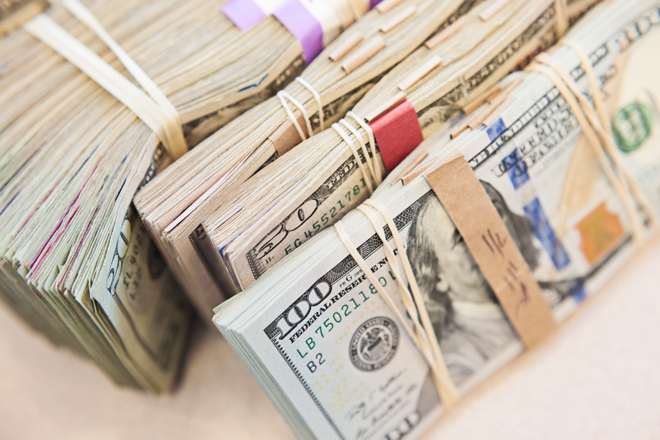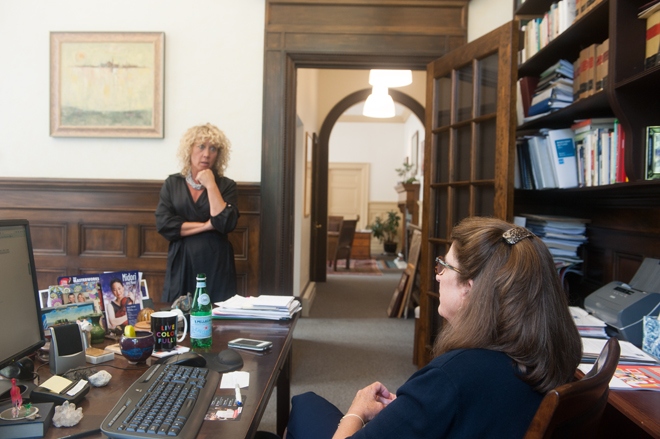The State of the Maine Economy
Financial experts weight in + our annual Financial Services Listing
The Maine economy is a lot like Maine citizens: steady. That’s especially clear when compared with the nation as a whole, prone to small “blips and dips,” as one financial consultant put it. “Our economy isn’t full of high highs and low lows,” explains Marci Booth of Booth, an accounting firm based in downtown Portland. “We don’t come tumbling down like the rest of the country, but we also don’t see the same insane highs.” Another way to understand this pattern is the Colgan Curve,named for Charles Colgan, an economist with the University of Southern Maine. “The rest of the country tends to follow a steep V-shape,” explains Dan Bookham, director of business development at Allen Insurance and Financial. “With this last recession, the country mirrored Maine’s economy in many ways—it followed our trend, which is a U-shaped curve.” Slow decline, slow climb out; few deep depressions, and few high spikes.
But everyone we spoke with agreed: right now, Maine is on the upswing—a slow and steady one. This positive trend is thanks in part to the deep ties people feel to their communities. Our economy is built on small and medium-sized businesses, and as Booth states, “Maine people love supporting Maine people.” “The Maine economy is stabilizing,” says Greg Dufour, president and CEO of Camden National Bank. “We’re seeing some pretty good signs: our unemployment levels are dropping, we’re seeing an upkick in home sales, as well as commercial investments.” But still, Dufour describes himself as “cautiously optimistic.” In our conversations with industry professionals, the word “cautious” came up time and again. Mainers are notoriously restrained with their money, and it seems we have good reason to be. As global gas prices rise—and with that, prices of everyday items like groceries and transportation—disposable income shrinks.
“It can be easy to forget that even the largest companies in Maine are small companies by a national perspective,” explains Yellow Light Breen, executive vice president at Bangor Savings Bank. “A company that has $10, $20, even $50 million in sales is a very significant employer and factor in the local economy, but from the point of view of national and international players, it’s still pretty small.” A small growth state, Maine has slow population growth and slow business growth. Yet slow isn’t necessarily bad. “We have a tremendous dependence on natural resources and tourism,” says Breen, “but when you look at the statistics on Maine, we are very diversified. No single industry—like oil or auto—will drive the local economy.” No boom, no bust. “Growth in Maine is a much steadier, more organic process.”
Mainers may be cautious, but they’re also thrifty and hardworking. “As a whole, people in Maine are great at buying local, great at saving, and great at connecting,” says Booth of our “small-business-based economy.” Tom Chester from Allen Insurance and Financial provides another perspective: “Portland is becoming a center of business, and that’s a good thing for Maine. Companies are relocating in Portland, and drawing their employees from the immediate area. That has driven the whole economy as a whole.” After years of working in large urban centers like New York, Boston, and Chicago, more and more skilled professionals are relocating to Maine. Whether they choose to telecommute, or join up with a Maine business, this influx of high-tech labor is helping the state scale the side of that U-curve.
“What we have in Maine is the opportunity to become home to many medium-sized businesses and knowledge-based businesses,” says Bookham. “As an economic strategy, we shouldn’t try to become Alabama,” focusing on large companies that promise steep, rapid growth. “We should try to become Finland, or New Zealand: a cold, out of the way place that produces amazing products and great knowledge. To that end, I think we’re closer than we’ve been in a long time.”
Manufacturing and agriculture will most likely continue to play a role in our economic landscape, but as Bookham suggests, there are certain benefits to decreasing our dependence on these sectors. When asked about the future of the Maine economy, Dufour cites several of the big investments that are coming into the Portland hospitality sector as a reason to feel hopeful. “We have some sizable investors coming into the state of Maine, particularly with the hotels in Portland. The Wall Street Journal is taking note,” he says, referring to an article from July 2014 about the new Westin Portland Harborview Hotel. “That’s investment capital coming to Maine in huge amounts, and we should celebrate and feel good about that.”
“On a personal level, I’m seeing more young adults returning to Maine,” adds Jenifer Wilson, president and chief operating officer at Deighan Wealth Advisors in Bangor. “We want to stop the brain drain. People who live away for four or five years see that the quality of life is different here, and they really appreciate what they had growing up. They want their family to have the same experience. So they are moving back, and I’m hoping that we will really see that affect the economy.”
Of course, just as meteorologists are famous for misreading the weather, it’s difficult to predict where the economy will go. For many of us, the most pressing problem is how to deal with our money now. This is why we have compiled a list of businesses that provide financial services. From venture capitalists to credit unions, our 2015 Financial Listing will help you open a savings account, plan for retirement, or find a venture capitalist to turn your brilliant business idea into reality.
A link to our Annual Financial Services Listing: http://bit.ly/1pLpHPa













































